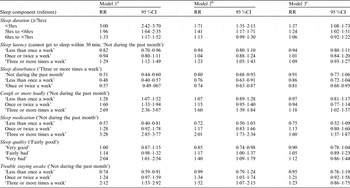The present study explored the relationship between diabetes and sleep using self-reported data on clinical diagnoses of late-onset (aged ⩾20yrs) diabetes and seven components of sleep from the first wave (2009–10) of the nationally representative UK Household Longitudinal Study (UKHLS); n = 29,452. This involved multinomial logistic regression before and after adjustment for potential confounders, and for body mass index (BMI) and hypertension.
Clinical diagnosis of diabetes (referent: no diagnosis) as predictor of seven sleep components.

aUnadjusted; bAdjusted for: sex, age, educational attainment, employment status, household structure( Reference Fowler, Ellison, Scott and Law 1 ) and marital status cAdjusted for: b and for body mass index and clinical diagnoses of high blood pressur
This is the largest study to-date to demonstrate a strong inverse association between late-onset diabetes and poor sleep, even after adjustment for potential confounding. It is also the first study to demonstrate that this association exists across a range of sleep components. However, because these findings stem from cross-sectional analyses of self-reported data for both the exposure and the outcome, further large-scale studies using longitudinal or experimental designs, and using objective measures of diabetes and/or sleep, are required to exclude the possibility that under-adjustment for latent confounders (particularly those associated with recall or reporting bias) are responsible for the association observed.


